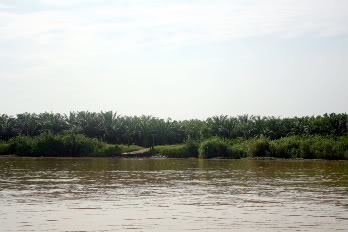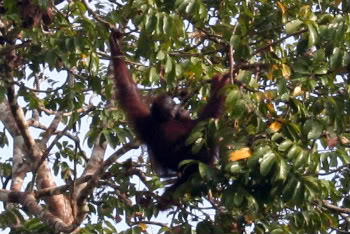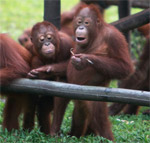During what was at times an emotional speech, Sabah’s Minister of Tourism, Culture, and Environment, Datuk Masidi Manjun, called on the palm oil industry to stop polluting rivers and work with NGOs to save orangutans and other wildlife. He delivered the speech on the first day of an Orangutan Conservation Colloquium held in early October in the Malaysian state of Sabah on the island of Borneo.
“As a member of the state government I say to you the state government is completely dependent on palm oil, yes, but the future generations are also dependent on the [oil palm] planters to ensure that they inherit a world much better than what we were given,” he said to a conference room filled with conservationists, primatologists, government officials, and representatives of the palm oil industry.
While Masidi said that the palm oil industry is “not solely to be blamed”, he added that they are “one of the culprits”.
 Oil palm plantations along the Kinabatangan River. Photo by: Jeremy Hance. |
“I myself have had a couple of sessions with the planters. They promised to do this and do that, but suddenly it’s clear to me it’s all been lip-service […] I went into the plantations myself to check and I know some of the mills have not done their job by letting pollutants out into the river.”
A study by the Department of Environment found that twenty-nine oil palm mills on Sabah’s Kinabatangan River were dumping pollution into the river. The river ecosystem is home to orangutans, Bornean pygmy elephants, proboscis monkeys, the storm’s stork, and many other species. Fifty years ago the Kinabatangan River was clear. Today, after decades of clear-cut logging and then the palm oil industry, it is coffee-colored.
“It doesn’t cost much money. With all the profit that we are taking from the soil, I think that it doesn’t really hurt the company to spend a bit of money […] to make sure that we don’t pollute the river,” Masidi said. “I mean ‘who are we’? I am throwing you this question because this is a very, very important question to ask. […] If we can’t even control pollution in the river then obviously something is wrong with us. Yes, we can take all the profit, all the money we want, but after that what will we do?”
Masidi expressed his view that he didn’t want to enforce compliance through state and federal law.
 Oil palm seed. Palm oil is used widely in processed foods. By virtue of its high yield, palm oil is a cheaper substitute than other vegetable oils. Photo by: Rhett A. Butler. |
“I would rather believe that planters are responsible enough to self regulate, self police. Why? Because, all of us are relations. Why? Because we are human beings and only human being can really put aside their emotion, their need to take more, to leave aside something for the future generations to enjoy.”
He warned that a time would come when pressure from abroad would force change on oil palm plantations and that “it makes sense” to beginning complying with progressive requirements now, such as those laid out by the Roundtable on Sustainable Palm Oil (RSPO).
“There are planters who already comply,” Masidi added. “And that shows it can be done. It can be done. You can make money and at the same time be socially responsible. It can be done.”
Masidi said the same attitude of socially responsibility should be brought to the issue of orangutan conservation: “let’s be magnamimous to the orangutan, they may be the man of the forest, and we are man of the town, but we are all ‘orangs’.”
Sabah’s orangutan population has declined by approximately half in fifty years, from an estimated 22,000 to 11,000. In addition, sixty-five percent of Sabah’s orangutans live outside of protected areas. Masidi did not back away from saying that this widespread decline was due in part to the rise of palm oil plantations over land that once held forest.
 Male orangutan feeding on fruit tree overlooking the Kinabatangan River. Photo by: Jeremy Hance. |
“[The] orangutan is living in a fragmented forest and the reason they are fragmented is because of planters. It’s okay, you by all means plant, but you have to give them a good opportunity to survive. You see orangutans and other animals, they need to cross from one jungle to another,” Masidi said, adding that such fragmentation was affecting more than just the orangutans. The Bornean pygmy rhinos, he said, “are not multiplying because they have been cut off, we didn’t provide corridors for them to walk from place to place to find a mate.”
In order to save orangutans—and other species—Masidi urged the palm oil industry and government to work willingly with local and international NGOs present at the meeting. Both sides are wary of each other. Many in the palm oil industry feel they have been unfairly singled out by environmental NGOs for deforestation and species loss. While the conservation community is frustrated by the palm oil industry consistently attempting to paint itself as ‘sustainable’, while not following through on environmental promises.
“To me, personally, I enjoy working with NGOs,” Masidi expounded. “I urge all departments, government bodies, not to treat NGOs as enemies but rather as friends who give you council from time to time. I think we need to tell ourselves that we are not exactly the experts on everything that we think we know. […] And I urge all of you not to be too defensive of what they [the NGOs] are going to say over the next few days, but in fact to take their words quite seriously, and ask ourselves are we moving in the right direction to conserve the orangutan?”
In the end Masidi urged the colloquium that it was time to put aside past differences and work together to create a society that would conserve rivers and wildlife.
 Orphaned orangutan at Sepilok near the Kinabatangan River. Photo by: Rhett A. Butler. |
“I say to you and I plead to you, look, […] why don’t we leave aside a legacy that the future generations can enjoy. The best legacy I can think of is to make sure we look after the pristine region of Sabah.”
The Minister of Tourism, Culture, and Environment concluded his speech: “The message is clear. Time is now. Get things done. Enough of talking,” and then he added, “after we talk for the next two days, of course.”
Following two days of intensive meetings between conservationists, the palm industry, and government officials, the colloquium adopted a resolution which included the acquisition of land for creating wildlife corridors of at least 100 meters along all major rivers and to connect fragmented forests. The resolution was handed off to Masidi on the last day. He promised to move quickly on it.
Related articles
Palm oil industry pledges wildlife corridors to save orangutans

(10/03/2009) In an unlikely—and perhaps tenuous—alliance, conservationists and the palm oil industry met this week to draw up plans to save Asia’s last great ape, the orangutan. As if to underscore the colloquium’s importance, delegates on arriving in the Malaysian State of Sabah found the capital covered in a thick and strange fog caused by the burning of rainforests and peat lands in neighboring Kalimantan. After two days of intensive meetings the colloquium adopted a resolution which included the acquisition of land for creating wildlife buffer zones of at least 100 meters along all major rivers, in addition to corridors for connecting forests. Researchers said such corridors were essential if orangutans were to have a future in Sabah.
Palm oil both a leading threat to orangutans and a key source of jobs in Sumatra

(09/24/2009) Of the world’s two species of orangutan, a great ape that shares 96 percent of man’s genetic makeup, the Sumatran orangutan is considerably more endangered than its cousin in Borneo. Today there are believed to be fewer than 7,000 Sumatran orangutans in the wild, a consequence of the wildlife trade, hunting, and accelerating destruction of their native forest habitat by loggers, small-scale farmers, and agribusiness. Gunung Leuser National Park in North Sumatra is one of the last strongholds for the species, serving as a refuge among paper pulp concessions and rubber and oil palm plantations. While orangutans are relatively well protected in areas around tourist centers, they are affected by poorly regulated interactions with tourists, which have increased the risk of disease and resulted in high mortality rates among infants near tourist centers like Bukit Lawang. Further, orangutans that range outside the park or live in remote areas or on its margins face conflicts with developers, including loggers, who may or may not know about the existence of the park, and plantation workers, who may kill any orangutans they encounter in the fields. Working to improve the fate of orangutans that find their way into plantations and unprotected community areas is the Orangutan Information Center (OIC), a local NGO that collaborates with the Sumatran Orangutan Society (SOS).
Britain bans palm oil ad campaign
(09/09/2009) Britain’s Advertising Standards Authority (ASA), a group that regulates advertisements, has again banned “misleading” ads by the palm oil industry, reports the Guardian. ASA ruled that a campaign run by the Malaysian Palm Oil Council (MPOC) makes dubious claims, including that palm oil is the “only product able to sustainably and efficiently meet a larger portion of the world’s increasing demand for oil crop-based consumer goods, foodstuffs and biofuels.” The ad said criticism over “rampant deforestation and unsound environmental practices” were part of “protectionist agendas” not based on scientific fact. ASA held the ad breached several of its advertising standards codes, including “substantiation,” “truthfulness,” and “environmental claims.” In rebuking the MPOC, the ASA said that the merits of new eco-certification scheme promoted by the palm oil industry is “still the subject of debate” and that the ad’s attacks on detractors implied that all criticisms of the palm oil industry “were without a valid or scientific basis.”
World Bank’s IFC suspends lending to palm oil companies
(09/09/2009) The World Bank has agreed to suspend International Finance Corporation (IFC) funding of the oil palm sector pending the development of safeguards to ensure that lending doesn’t cause social or environmental harm, according to a letter by World Bank President Robert Zoellick to NGOs. A recent internal audit found that IFC funding of the Wilmar Group, a plantation developer, violated the IFC’s own procedures, allowing commercial concerns to trump environmental and social standards. The findings were championed by environmental and indigenous rights’ groups who have criticized World Bank support for industrial oil palm development which they say has driven large-scale destruction of forests in Indonesia, boosting greenhouse gas emissions, endangering rare and charismatic species of wildlife, including the orangutan, and displacing forest communities.
46 rescued orangutans returned to the wild by helicopter in Borneo
(09/05/2009) The Borneo Orangutan Survival Foundation (BOSF) has successfully released 46 orangutans back into the wild. The orangutans had been rescued from forest fragments and housed for months at the Nyaru Menteng Rescue and Reintroduction Project in Central Kalimantan until suitable — and secure — habitat was located. The release site is a section of rainforest in the upper Barito region of Central Kalimantan, within the Heart of Borneo.
20,000 orangutans killed or poached in 10 years without a single prosecution
(08/24/2009) At least 20,000 orangutans have been killed or captured for the illegal pet trade in the past ten years in Indonesia without a single prosecution, according to a report published by Nature Alert and the Centre for Orangutan Protection, groups that campaign on behalf of orangutans.
Rehabilitation not enough to solve orangutan crisis in Indonesia

(08/20/2009) A baby orangutan ambles across the grass at the Borneo Orangutan Survival Foundation’s Nyaru Menteng rehabilitation center in Central Kalimantan, in the heart of Indonesian Borneo. The ape pauses, picks up a stick and makes his way over to a plastic log, lined with small holes. Breaking the stick in two, he pokes one end into a hole in an effort to extract honey that has been deposited by a conservation worker. His expression shows the tool’s use has been fruitful. But he is not alone. To his right another orangutan has turned half a coconut shell into a helmet, two others wrestle on the lawn, and another youngster scales a papaya tree. There are dozens of orangutans, all of which are about the same age. Just outside the compound, dozens of younger orangutans are getting climbing lessons from the Borneo Orangutan Survival Foundation (BOS) staff, while still younger orangutans are being fed milk from bottles in a nearby nursery. Still more orangutans—teenagers and adults—can be found on “Orangutan Island” beyond the center’s main grounds. Meanwhile several recently wild orangutans sit in cages. This is a waiting game. BOS hopes to eventually release all of these orangutans back into their natural habitat—the majestic rainforests and swampy peatlands of Central Kalimantan, on the island of Borneo. But for many, this is a fate that may never be realized.
Issues around palm oil development prove complex, controversial
(08/12/2009) A new report from published by the Center for International Forestry Research (CIFOR) highlights the benefits — and controversies — of large-scale expansion of oil palm agriculture in Southeast Asia. The review, titled “The impacts and opportunities of oil palm in Southeast Asia: What do we know and what do we need to know?”, notes that while oil palm is a highly productive and profitable crop, there are serious concerns about its environmental and social impact when established on disputed land or in place of tropical forests and peatlands.
Failure to support greener palm oil may lead industry to abandon environmental measures
(07/08/2009) Consumer apathy towards eco-certified palm oil have undermined efforts to improve the environmental performance of the industry, a top industry official told Reuters.
UK firm plans to log habitat of critically endangered orangutan for palm oil production
(06/23/2009) A Scottish firm has been implicated in funding a plan that would destroy the rainforest habitat of critically endangered orangutans in Sumatra.
Malaysian palm oil chief claims oil palm plantations help orangutans
(06/18/2009) Dr. Yusof Basiron, CEO of the Malaysian Palm Oil Council, the government-backed marketing arm of the Malaysian palm oil industry, claims on his blog that endangered orangutans benefit from living in proximity to oil palm plantations. Environmentalists scoff at the notion, maintaining that oil palm expansion is one of the greatest threats to orangutans.